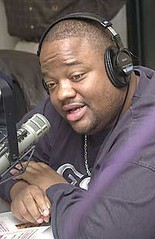Show Me The Wins and I'll Show You the Money

I must have missed the memo -- the one that explained why the 2005 baseball season was shaping up to be the greatest year in the history of the game. Bud Selig couldn't stop talking about it during the All-Star Break. Everyday, he called a press conference or scheduled a TV interview to announce it. However, no season in which Barry Bonds hasn't played a single game can possibly be considered the greatest ever. Don't get me wrong though -- I don't want Bonds to come back, even though the game needs him now more than ever. Regardless, he should walk away from baseball and never come back. You see, Barry is standing in a very large room, and in that room is a white elephant. Clearly, this is all about racism, and if you don't know how or why, perhaps you'd better take a closer look at yourself.
With or without Bonds, baseball is in serious trouble and the league needs to make several changes to keep the game strong. The international style of baseball that is played in places like Venezuela and the Dominican Republic is clearly superior to the American style. If you don't believe me, look no further than the spectacular performances by David Ortiz and Bobby Abreu in the home run derby. International stars are forcing the game to change, and they're changing it for the better. In turn, it is the league's responsibility to do something about the current salary structure, which clearly isn't working to the benefit of the fans or the players.
The most important thing to a baseball fan is to see their team win. Fans don't care about home run contests or All-Star Games because those things aren't important. They want to see a brand of winning baseball on the field in their home city. The best way -- if not the only way -- to accomplish this is to tie salaries to wins. It's simple. At your workplace, if you do a good job, then you get a raise. If you're sick and need to stay home, then your work doesn't get done, your employer suffers, and you don't get paid. What could make more sense?
Look at the NHL. Cancelling the 2004-5 season, contrary to what many people believe, is the best thing that could have happened to the game of hockey. The NHL is now in the enviable position of being able to institute some major changes before restarting play. We've heard about salary rollbacks, upping the number of playoff teams from 16 to 20, and many other proposed reforms. Everybody has an idea about improving the NHL and all this brainstorming can do nothing but benefit the game. Still, they need to take things to the next level and link player salaries to wins. Hockey is a physical game, and players who are motivated by money are more likely to play harder and lead their teams to victory. Players will put a little more muscle behind each shots if they know that it could mean the difference between a large and a small payday. These are the sorts of fan-friendly changes that will bring people back to the arenas, and the NHL needs every fan they can get because the last year has been devastating for the game of hockey. It's hard to imagine any league being in worse shape than the NHL is right now, and they need the support of their fans right now more than ever.
MLB should take a page out of the NHL's book. Do you think the Yankees would have lost so many games earlier in the season if A-Rod was paid more money when the team won than when they lost? Derek Jeter would never stand for a Yankees' loss if his paycheck was on the line each and every day. At the other extreme, you have teams like the Royals and the Devil Rays. It's no wonder that a great manager like Lou Piniella can't get any wins out of the Devil Rays -- there's no incentive for his players to win with that miniscule $30 million payroll. Why should Jorge Cantu bust his butt when he's only making a few hundred thousand dollars per year? Are you truly surprised that the Rays are in last place again?
Bud Selig is afraid. He wants to tell people how great this season has been and he has every reason to do so. Attendance figures are skyrocketing and the quality of play has been excellent. However, he's worried about criticism from fans and writers, who have been embarassing the commisioner by highlighting the glaring weaknesses in the way the game is played. The ball is in Selig's court, and he needs to act fast.
Jason Whitlock writes for the Kansas City Star and is an occasional contributor to E$PN's Page 2

0 Comments:
Post a Comment
<< Home